- Home
- Chris Wraight
The Path of Heaven Page 16
The Path of Heaven Read online
Page 16
Veil gave no sign.
‘That might have been the end to it,’ Ilya said. ‘But there are those within the Legion who are adept at decoding hidden signs, ones that would have been invisible to me no matter how long I looked at them. After much toil, the Stormseers gave me a name – Herevail. It was clear that he had gone there. We did not know why. We did not know when. It took me a long time to persuade the primarch to permit an expedition, and in order to achieve it we had to combine it with a dozen other raids lest our intentions be read. That has no doubt exacted a cost in lives. It is important, then, that it was not done for nothing.’ She looked directly at him. ‘I had hoped to find this man again, for I believe that if anyone could guide us out of the tempest, he could. You know of whom I speak. You have already named him. Pieter Achelieux. Veil, you must tell me if you know – where is he now?’
Veil chuckled sourly. ‘I wish I knew. Well, I do know, but it will do you no good.’
Ilya pulled back, giving him space.
‘He was never on Herevail for long,’ said Veil. ‘He came and went, like they all do. Perhaps you have never seen a Navigator House’s own vessels? They are like nothing you have ever sailed in. He would embark on journeys that should have taken weeks, and be there in days. He could read the Seethe like a mortal reads a chrono.’
‘The Seethe?’
‘The immaterium. The warp. Achelieux was the best of the long generation, they told me, and having witnessed him scry the tides, I cannot dispute it. Some had already marked him for Paternova, given a few centuries more. Who knows? There is always gossip. But he was good. By the Cartomancer, he was good. And he left it all behind, all for the greater purpose.’
‘Which was?’
‘What we were doing on Herevail. How can I explain it to you?’ He pressed his fingers together and frowned. ‘There are schools of thought in the Houses. Different methods of engaging with the Seethe. Some treat it like a beast – an animal, to be tamed or ridden. Others as a ritual, a kind of dance. Or an artwork, even – can you imagine? But there is a third doctrine – that the warp is nothing more than a mirror, one that can be charted just as real space is charted. They believe the paradoxes can be overcome, and that one day living maps will be created, ones that predict the storms and give reliable guides to the aether-flux.’ Veil smiled absently, remembering. ‘That was what we were doing in Vorlax. We were topographers, psycho-sounders, aether-readers. We were attempting to compass the stratum aetheris. All of it. It was the work of generations.’
‘Did you succeed?’
‘We were nowhere close. We kept going because he was so sure, and he demanded it, and he had a way of making you believe that it was possible. But there were other things, too – places he would go to. I wasn’t privy to all the secrets, but we did know about Dark Glass. Just the name. I never saw it, never knew where it was. He’d gone there, but this time he never came back.
‘You heard nothing?’
‘Not a thing. We kept working. We thought he’d return. When they came, at first I thought it might be something to do with him. Throne of Earth, we were so unprepared.’ Veil shuddered. ‘Not that we could have done much if we had known.’
‘What is Dark Glass?’
‘I do not know.’
‘You must do.’ Ilya felt her frustration rising. ‘The name must mean something.’
‘It was a component of the project. A place. That is all.’ Veil looked distressed. ‘If I had known more, do you not think I would have gone after him? He was close. He was a Novator – they bind their secrets within secrets. I was desperate to find him – we all were.’
‘Anything – a system name, a subsector.’
Veil looked genuinely frustrated. Ilya had interrogated many subjects in her time, and had a good sense for deception. Right then, she detected none.
‘He hid his tracks,’ said Veil, pulling his robes about him and shivering. ‘I would have followed him. But all I have is the name, and that would not have got me far.’
‘Nor us,’ said Ilya, grimly. ‘You cannot tell me anything else?’
‘Lots of things,’ said Veil, brightening. ‘I can tell you of the warp’s wonders, the arts and sciences of its delving. I know things even the Oculi do not, for what they see with their Eye I have had to scour from the depths of Nobilite manuals. I know all these things. I can tell you them all.’
Ilya felt her heart sink. If he truly could not follow Achelieux’s route, then the raids were all for nothing. Tachseer’s counsel would prevail, and the Legion would erase its oaths in death, achieving nothing but a little more delay to the Warmaster’s offensive.
‘Keeping talking,’ she said, trying not to let her despair show, trying to hold on to diminishing hope. ‘Tell me everything you know.’
The land before them smouldered in columns of rust-tinged darkness. Trenches scored the charred earth, each sodden with oily water. The sky was occluded, apart from savage flashes of white as massed las-barrages kicked out.
Far ahead, more than ten kilometres to the north east, a column of armour smashed its way towards the besieged walls of the Imperial bastion-city Craesus, demolishing haphazard lines of razor wire and iron-cross tank defences. In the wake of the mechanised spearhead, ranks of masked troopers marched, lasguns and carapace-shredders hoisted onto their shoulders. Their visors glowed ghost-blue in the drifting night.
Across the cloud-barred horizon, greater explosions hammered out, underlighting thunderheads with flicker-patterns of illumination. The dirty trails of Thunderhawk backwash criss-crossed the light show, overseen by the hazy shadows of orbital bulk landers lurching their way to planetfall.
Another world was being carved apart, city by city. The IV Legion had arrived, as just one of a thousand operations undertaken by that vast host of siege-breakers. The precise denomination did not concern those who darted under the shadow of the oncoming vanguard, though, wheeling amid the gloom like unlocked stars, for life and death meant precisely nothing for those who had sworn it away.
Torghun was at the apex, closely followed by Sanyasa. The rest came behind in a wedge formation, crouched in their saddles, holding their machines low and tight to the earth. The jetbikes’ mag-plates whined as they grazed the poisoned soils, underflying sensor-umbrellas and moving far too fast for tracker sweeps.
‘You did not speak the truth to me, khan,’ voxed Sanyasa, tilting to avoid a burning web of metal struts.
‘When was this?’ Torghun replied, arming his holan clamps and switching to short-range targeting.
‘When you took the communication from the fleet.’
‘Brother, this is really not the time.’
The jetbike formation hurtled towards the Land Raider column, still undetected, but now in visual range. Solid clunks rang out as every warrior of the squadron slotted heavy bolt-rounds into the in-line magazines.
‘Nonetheless. You did not speak the truth.’
‘Concentrate – they have seen us.’
Tracer-fire spat out from the armoured column, followed by the dance of projectiles. The Land Raiders were turning, pivoting heavily on their axes, and the troopers were rushing out, falling to the ground and angling their guns.
All too late.
‘Now take them!’ Torghun cried, piling on the velocity.
The jetbikes ate up the ground, driving furrows ahead of them with massed heavy bolter fire. The earth exploded upwards into a rolling tide, punctuated by the diced internals of the mortals caught up in the hurricane.
Then they were over the tanks, and every rider loosed their holan clamps. The star-shaped mines flew out, slamming into the adamantium hulls of the Land Raiders and locking fast. In a fraction of a second, the jetbikes were on the far side and gunning hard, pursued by a hail of return fire.
The clamps went off. Two Land Raiders blew up, their hulls destroyed by the d
ozens of explosives latched to their exteriors. Three more were rocked to a standstill, grinding down into the mire with their smokestacks churning. Seven more received glancing damage and came after them, trundling across pitted ground, las-beams stabbing out into the night, their own bolters thundering.
It was still too slow. The sagyar mazan whooped wildly, pulling clear of ground-level, putting distance between them and the vengeful armour. They burned across the wasteland, ducking and slewing, riding the hail of laser-light like mariners on the waves.
Soon they were beyond pursuit, haring back to the rendezvous with the lifter. Their presence had been detected now and the entire planetary attack force would be converging on them. They had perhaps seven minutes to make it off-world before the pincers caught up.
‘So what did it say?’ voxed Sanyasa, driving hard.
‘I told you,’ voxed Torghun, irritated.
‘The Horde will never attack Lansis. It will never attack Gethmora. I regret this, but you are lying to me, darga.’
Torghun glanced over at Sanyasa’s speed-blurred outline. ‘Say that with a weapon in my hand.’
‘They have called us back.’
The wedge sped onwards, sweeping in a curve away from doomed Craesus, just one desperate chase on a world scored with a million other duels.
‘And if they have?’ replied Torghun. ‘What would that matter? Penance through death. That is what we are now.’
‘Not by choice.’
‘It was all about choice.’
‘That can change. We are still alive.’
‘If you do not cease this, that too may change.’
Ahead of them, shrouded by heavy clouds of soot and drifting ash, the lifter was coming down, running dark, its presence only given away by forward short-range augurs. The jetbikes decelerated by the bare minimum, scraping up the open ramp and skidding into the lifter’s hangar. As soon as the last one was in, the ship’s atmospheric drives boosted back to full power and the void doors hauled themselves closed.
Torghun kicked his bike’s power off, dismounted and strode over to where Sanyasa was doing the same. He caught the warrior by the chest and slammed him into the hangar wall.
‘Speak to me like that again and I end you.’
Sanyasa did not fight back. He let his arms go limp. Around them both, the rest of the kill-squad assembled warily. ‘I would follow you into the ice-halls of the underworld, my khan,’ he said, calmly, reverting to the old rank designation. ‘You do not need to keep this from us.’
Torghun held position for a few moments longer, then let Sanyasa go. He twisted his helm free, turned away and ran his gauntlet across his cropped scalp. ‘Damn you,’ he breathed. ‘And damn them.’
Sanyasa removed his own helm. ‘The need must be great for them to consider it.’
‘Of course the need is great,’ Torghun spat back. ‘What does that alter? We are alone now. That was how they wanted it. We all took the trials.’
Muffled cracks made the lifter’s hull shake. Something had trained weapons on them, and the vessel picked up speed.
Sanyasa mag-locked his helm and wiped sweat from his face. ‘What did it say?’
Around them, the surviving members of the kill-squad clustered, all of them looking at Torghun. None had drawn a blade, but their faces were implacable. After more than four years, they wanted to know.
Torghun suddenly remembered his last sight of the Starspear, from the shuttle that would take him to the flagship for his interrogation. He remembered the shame of it. He remembered the Techmarines scouring the lightning strike from his pauldron. He remembered the looks on the faces of his judges. Chogorian faces, they had been. Alien faces.
Sanyasa did not move. The others did not move. The hull-shakes died away, indicating that the lifter had pulled clear of land-based attacks and would now make it back to R54 in one piece.
So they would live to fight another day. They would live to take the war to the enemy one more time.
‘What did they say?’ asked Sanyasa again.
Torghun looked back to him, back at the still-proud face, the epitome of the plains-warrior even after being cast loose. Sanyasa had never stopped believing.
For himself, Torghun had never truly believed, not even from the start. That was always the difference, the one that had opened the door to weakness.
He took a deep, resigned breath. This could bring nothing but pain.
The sagyar mazan speed in to attack
Eleven
The first void-soundings came in at chrono-mark -52.13 from expected warp re-entry. It took the master of the watch on the escort frigate Melak Karta thirteen seconds to assess the augur-profile and pass the signals up. Algu Khan, legionary commander of the much-depleted Brotherhood of the Pennant Spear, was on the bridge before the chrono ticked over to -48.00, and gave the order to run.
All plasma engines were fired into overdrive, boosting the frigate past the top edge of its velocity envelope. Algu ordered it to push below the system’s plane, giving the option to loop around the gravity field of the iron-core giant Revo to gain momentum for an early return to the aether.
Behind them, the enemy gained quickly. The Death Guard cruiser Implacable was already operating its far more powerful sub-warp drives at full pitch, and its six thrusters left dirty smudges of red afterglow as they thundered.
‘Rear fusillade,’ ordered Algu, watching the onset calmly, knowing it would do little to halt the enemy’s advance.
Torpedoes shot away aft, streaking into the void in a scatter pattern of bright white. The Implacable responded with a fore-shot mix of void flak and tracker torpedoes of its own, the bulk of the fusillade disappearing in a rippling wave of explosions. The remainder of the Melak Karta’s volley was absorbed by its pursuer’s fore void shield array.
Algu watched the enemy’s response, using the experience he had gained in over a century of void war to gauge their intentions.
‘Void-seal armour,’ he voxed to his warriors stationed across the frigate’s decks. ‘Prepare for boarding.’
The order was probably unnecessary. Most ship actions of this sort came down to a boarding manoeuvre in the end, and so his troops would already be preparing. If it caught them, the larger enemy vessel was probably capable of destroying them, but in a war that had extracted such a fearful toll on the fleets of both sides, and which had slowed new vessel production from the forge worlds to near zero, it was more usual for commanders to try to take over enemy craft for their own use.
That made things interesting. Algu had eighty-two battle-brothers aboard, plus several hundred mortal auxiliary troops. The frigate was still well-stocked with close-range weaponry, and would reap a heavy toll on boarding-tubes if they got in close.
But it was still better to run. The Implacable likely contained twice that number of XIV Legion warriors, and there were few better exponents of close-confines fire-fights: other Legions might have a more developed tactical sense, but it took a lot to put down every single Death Guard warrior, and in a tight space with few options for flanking moves, that mattered.
‘Coming within range of Revo’s gravity well,’ reported Idda, the master of the watch. All across the bridge, the crew were working hard to extract more power to feed the main drives, to calculate the slingshot angles, to find a balance between the hundred competing demands on core power.
‘Can you outpace them?’ Algu asked, absently checking the energy readout on his chainsword.
Idda took a few moments to reply, his face buried in a nest of angled augur-lenses.
‘Perhaps,’ he replied, a dry smile on his weather-beaten face. ‘If you risk the main reactor it might be done.’
On another occasion, Algu might have stayed to fight. Odds could be overcome, and they had been in the past. Revo’s enormous, space-distorting bulk could be used, as could the my
riad tricks they had picked up since the proud tradition of Legion warfare had descended into the brutal post-Chondax era of scrappy civil war.
Not this time. The Khagan’s muster-orders were still lodged in his armour’s internal buffers, giving precise coordinates and timing windows. Better to decline a battle in order to make the war.
‘Do it,’ he ordered, deleting all mission-critical data from his armour’s systems with a series of retinal movements. ‘Purge all bridge cogitators of input data over the last standard week and reset encryption on the rest. Then run the reactors ragged. Get us out of here.’
The orders were conveyed, cascading down the ranks, enacted efficiently. The enginarium crew keyed the main drives, the navigation stations plotted the main route, the pilots jinked and danced through the Implacable’s long-range probing fire, and the colossal dirt-grey sphere of Revo entered visual range.
‘Entering slingshot perimeter,’ intoned Erya, mistress of sub-warp navigation, rocking in her station-throne as the enemy gunners began to find their range. ‘Velocity increasing.’
‘Keep us steady,’ ordered Algu, watching the magnified ocular scopes carefully.
As he spoke, something hit the rear void shields hard, catapulting the Melak Karta over to starboard. The frigate’s structure shuddered, and the echoes of explosions could be heard filtering up from the decks below.
Algu’s stance flexed with the movement. Warning runes spread like a rash across the bridge’s comm-stations. The hurtling run continued, and Revo loomed ahead of them, its circular outline now clear against the blackness beyond.
It was then that the first uneasiness came.
‘You have run a forward scan of the planet?’ he asked.
Idda looked up. ‘Why? It would be pointless. The core is too dense.’
Algu turned to Erya. ‘Then pull us out.’
Uncharacteristically, she hesitated. ‘My khan, if we–’
‘Pull us out.’ Algu expanded the range of the tactical scope even as his navigation crew struggled to alter the incoming angles. ‘Get us away from it. Now.’

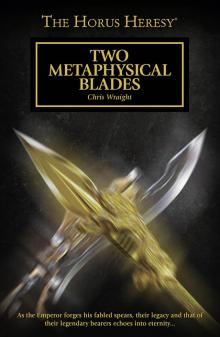 Two Metaphysical Blades
Two Metaphysical Blades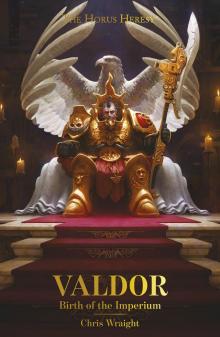 Valdor: Birth of the Imperium
Valdor: Birth of the Imperium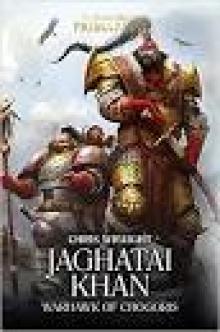 JAGHATAI KHAN WARHAWK OF CHOGORIS
JAGHATAI KHAN WARHAWK OF CHOGORIS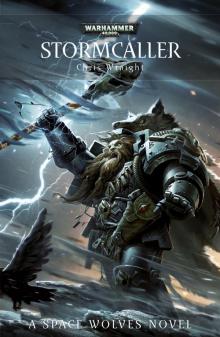 Stormcaller
Stormcaller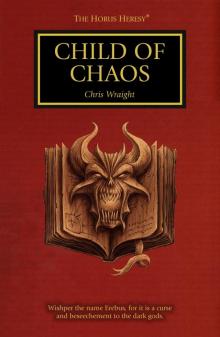 Child of Chaos
Child of Chaos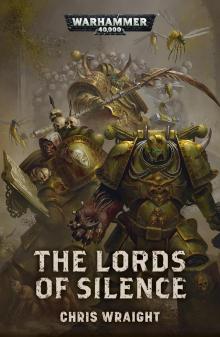 The Lords of Silence
The Lords of Silence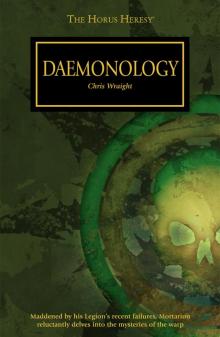 Daemonology
Daemonology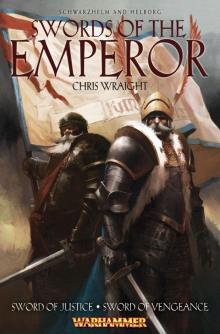 Swords of the Emperor
Swords of the Emperor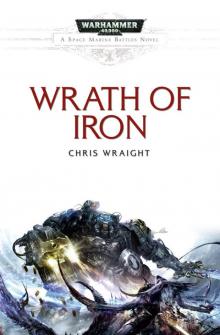 Wrath of Iron
Wrath of Iron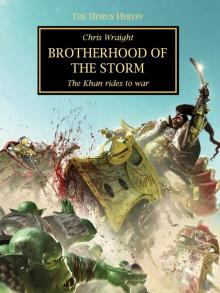 Brothers of the Storm
Brothers of the Storm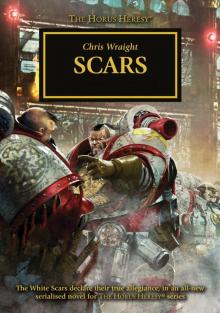 Horus Heresy: Scars
Horus Heresy: Scars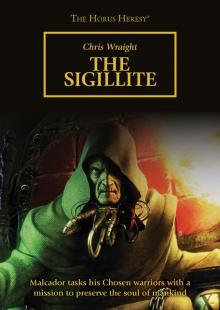 The Sigillite
The Sigillite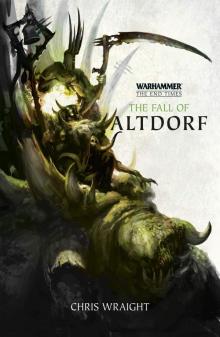 The End Times | The Fall of Altdorf
The End Times | The Fall of Altdorf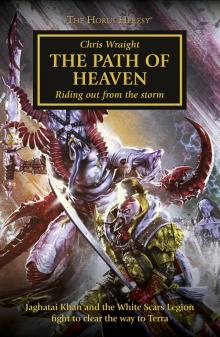 The Path of Heaven
The Path of Heaven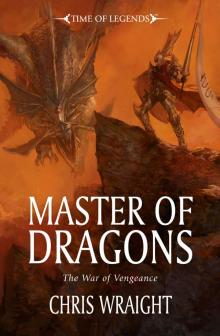 Master of Dragons
Master of Dragons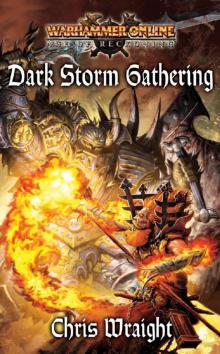 WH-Warhammer Online-Age of Reckoning 02(R)-Dark Storm Gathering
WH-Warhammer Online-Age of Reckoning 02(R)-Dark Storm Gathering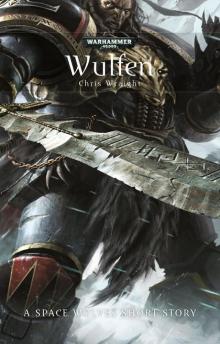 Wulfen
Wulfen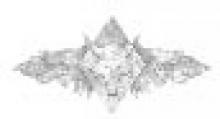 Battle Of The Fang
Battle Of The Fang Onyx
Onyx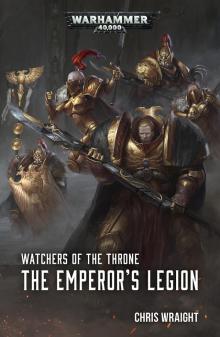 Watchers of the Throne: The Emperor’s Legion
Watchers of the Throne: The Emperor’s Legion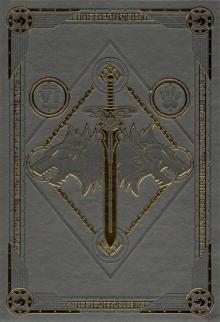 Leman Russ: The Great Wolf
Leman Russ: The Great Wolf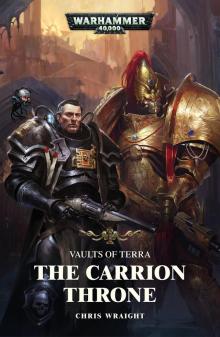 Vaults of Terra: The Carrion Throne
Vaults of Terra: The Carrion Throne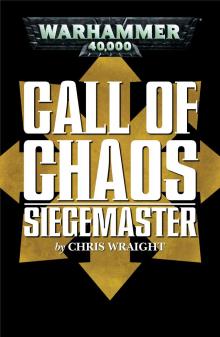 Siegemaster
Siegemaster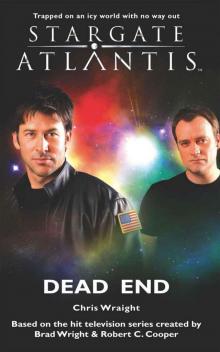 STARGATE ATLANTIS: Dead End
STARGATE ATLANTIS: Dead End Scars
Scars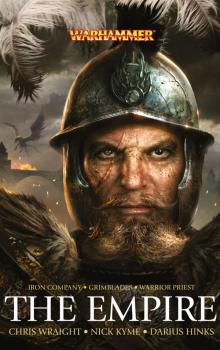 The Empire Omnibus
The Empire Omnibus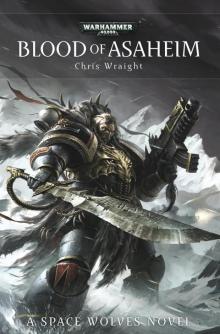 Blood of Asaheim
Blood of Asaheim